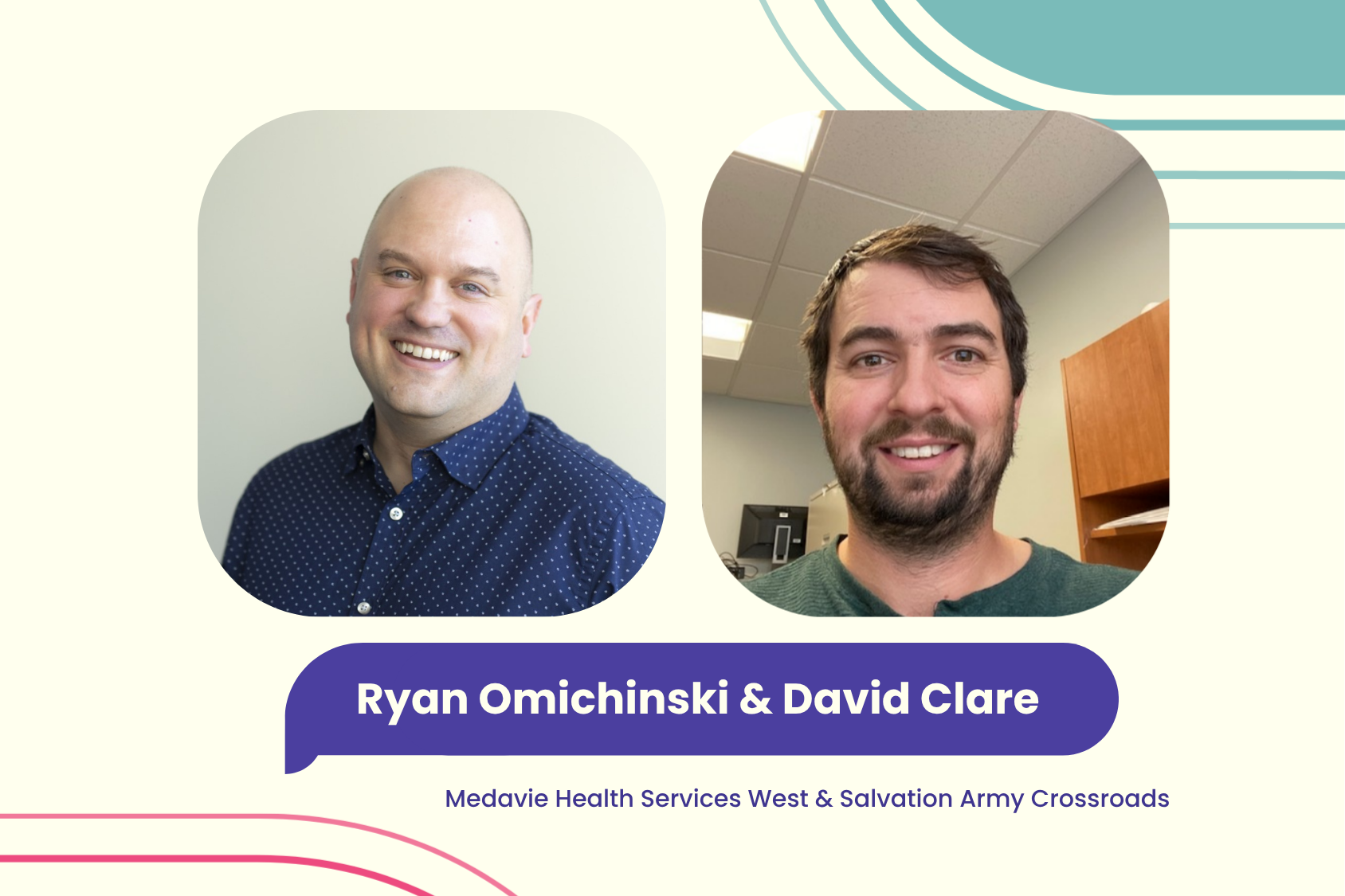In this section :
The 2025 theme for Canadian Patient Safety Week, All Voices for Safer Care, reminds us that building safer healthcare systems isn’t the responsibility of one person or one role—it’s something we create together, by supporting every role and building trust across the system.
Throughout this blog series, we’re sharing the stories of champions from across Canada who are helping redefine what safer care means today: from point of care to leadership, from lived experience to learning systems.
Their insights show how building safer systems, supporting all roles, and listening with curiosity are essential steps toward safer, more equitable care for everyone.
Ryan Omichinski is the operations manager for mobile integrated health program at Medavie Health Services West, and David Clare is Housing Services Manager at the Salvation Army Crossroads in Saskatoon, Saskatchewan. The two are part of a pan-Canadian initiative to improve access to equity-oriented palliative care with and for people experiencing homelessness or vulnerable housing.
Many palliative care models don’t meet the needs of people experiencing homelessness or housing insecurity, where barriers to diagnosis and treatment often turn preventable conditions into life-threatening ones.
To break through these barriers, the Salvation Army Crossroads and Medavie Health Services have partnered to improve the safety of healthcare for people experiencing homelessness or vulnerable housing. This initiative is part of Healthcare Excellence Canada’s Improving Equity in Access to Palliative Care collaborative delivered in partnership with the Canadian Partnership Against Cancer. Medavie’s Ryan Omichinski and the Salvation Army’s David Clare speak to how they are bringing streamlined and dignified care closer to those using the Salvation Army’s shelter sites in Saskatoon.
In his time with the Salvation Army Crossroads, Housing Services Manager David Clare has come to understand two important things: first, that people generally want to receive support. And secondly, many people may decline that support at the time it is offered.
The two statements may seem contradictory, but the explanation is straightforward. “Our guests who have chosen not to access care at certain times have overwhelmingly told us it’s because they have had a bad experience – they’ve been ignored, had their needs dismissed, or felt they were being pushed out the door,” says David. “Because of that bad experience, they’re unlikely to return to a similar environment – a hospital emergency room, for example – because they don’t feel safe there.”
Creating safer, more accessible care spaces
The role of physical space is just one aspect of the initiative that the Salvation Army Crossroads is undertaking with Medavie Health Services West. Their partnership embeds paramedicine services within the shelter, giving residents easier access to dignified and coordinated care. They’re also engaging the community they serve in planning a health clinic designed for the neighbourhood’s unique needs.
“Safer care begins with delivering healthcare where and when an individual needs or wants it, whether that's in a facility, their home, or another comfortable setting,” says Ryan Omichinski, Operations Manager for Mobile Integrated Health Programs at Medavie Health Services West. “Through our partnership with the Salvation Army Crossroads, we have the opportunity to provide a safe place and shelter for people experiencing structural barriers to receive medical care they may not otherwise have access to.”
Redefining safety through empathy and dignity
David emphasizes that safer care is about more than the delivery of medical services. In shelter environments, care must also support foundational needs such as food, shelter, safety and belonging, in a way that upholds each person’s dignity. To do this well, providers must adopt a cultural and trauma-informed lens, ensuring that every interaction is grounded in empathy and respect. There must be trust between the patient and care team.
“Safety isn’t just about a practice of how you administer medication or other tasks,” adds Ryan. “More than policies and procedures, we need to find ways to bring our clients, patients, caregivers, families and those with lived experience into the decision-making process to truly allow individuals to feel safe.”
By shifting care from hospital hallways to safer spaces – and approaching each interaction with empathy, dignity, and meaningful support – David and Ryan are helping to rewrite what safety in healthcare means for people who have historically been faced with barriers to accessing the system.
“People generally want care, but creating a supportive space and engaging non-judgmentally is critical. Then, listen with intention: you’ll see and hear things you otherwise would have missed.”
- David Clare, Housing Services Manager at Salvation Army in Saskatoon, Saskatchewan
Promising practices for improving equity in access to palliative care
Communities across Canada are improving access to safe and high-quality palliative care for people experiencing structural vulnerabilities.
Promising practices for improving equity in access to palliative care
Communities across Canada are improving access to safe and high-quality palliative care for people experiencing structural vulnerabilities.
